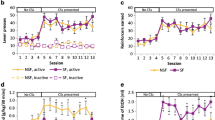Abstract
In the present study, the reactivity of striatal dopamine and dopamine-sensitive neurons in superfused striatal slices of ethanol-experienced rats was compared to that of ethanol-naive rats, 3 weeks after oral ethanol self-administration. During the acquisition phase (17 days), rats were offered increasing concentrations of ethanol (from 2 to 10%, 24 h per day) on an alternate-day schedule in a free choice with water. Following 2 weeks of unrestricted 10% ethanol consumption, the highest and lowest drinkers (representing about 25% of the upper and lower extremes of the total population) were selected. Preliminary experiments revealed that both groups of rats displayed a profound increase in ethanol consumption and preference 3 weeks after cessation of ethanol self-administration (deprivation effect). This deprivation effect was associated with an increase in electrically evoked release of [3H]dopamine from superfused nucleus accumbens slices, whereas the evoked [3H]dopamine release from caudate putamen slices remained unchanged. In slices of the caudate putamen, but not in nucleus accumbens slices, postsynaptic dopamine D1 receptor-stimulated cyclic AMP production was also enhanced. In addition, prior ethanol consumption enhanced the electrically evoked release of [14C]acetylcholine release in both striatal regions. Interestingly, the magnitude of these long-term neuroadaptations correlated with the amount of daily ethanol consumption, i.e. neuronal hyperresponsiveness in the striatum was more profound in the high than in the low ethanol drinkers. These data show for the first time that unrestricted free-choice ethanol consumption in rats is associated with a long-term increase in dopaminergic and cholinergic neurotransmission in the nucleus accumbens and caudate putamen. These (and other) neuroadaptations may underlie the enhanced motivation to self-administer ethanol and the maintenance of ethanol consumption long after deprivation.
Similar content being viewed by others
Author information
Authors and Affiliations
Additional information
Received: 14 April 1998/Final version: 15 June 1998
Rights and permissions
About this article
Cite this article
Nestby, P., Vanderschuren, L., De Vries, T. et al. Unrestricted free-choice ethanol self-administration in rats causes long-term neuroadaptations in the nucleus accumbens and caudate putamen. Psychopharmacology 141, 307–314 (1999). https://doi.org/10.1007/s002130050838
Issue Date:
DOI: https://doi.org/10.1007/s002130050838




